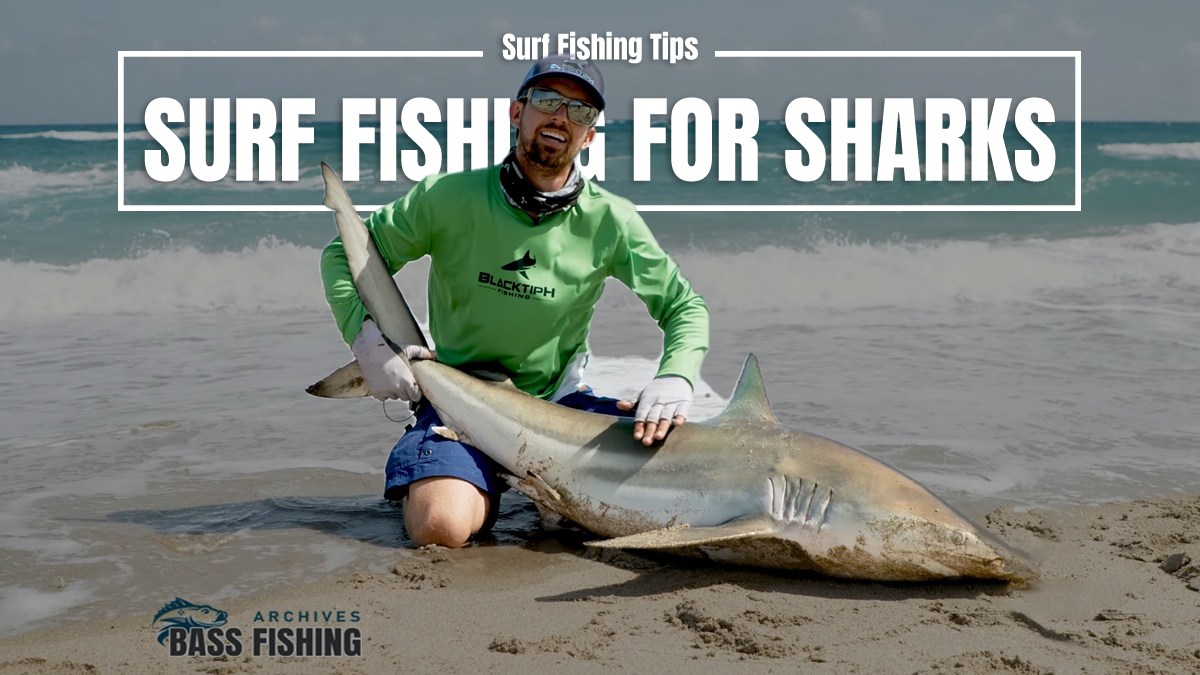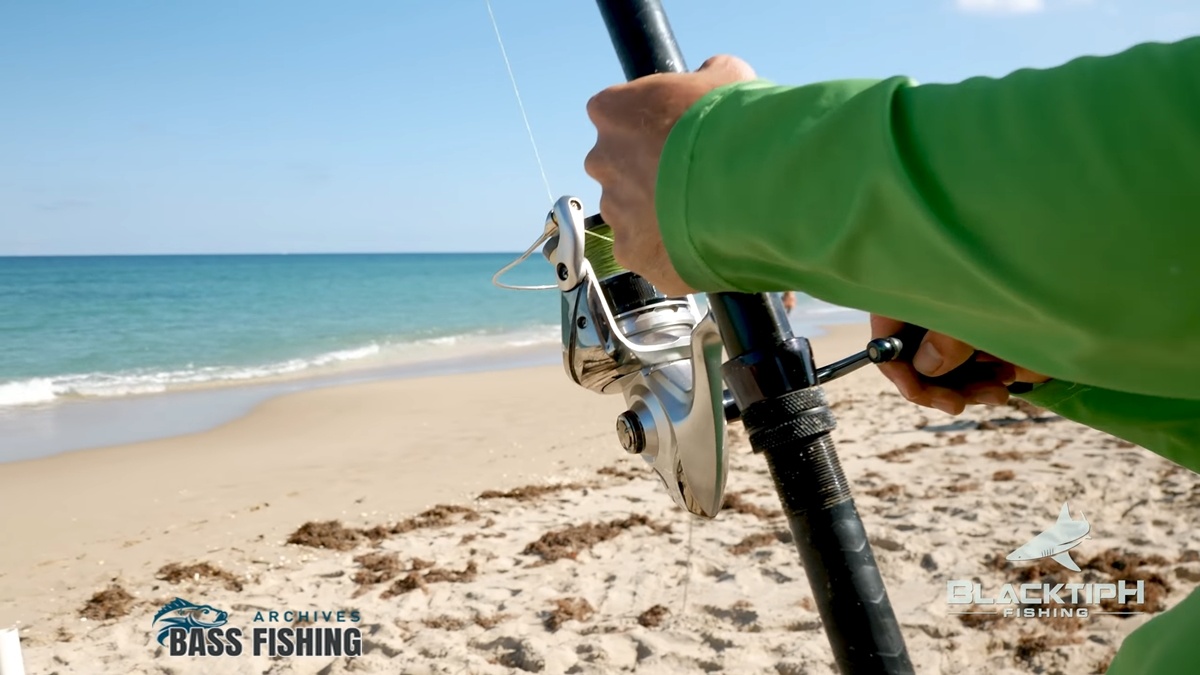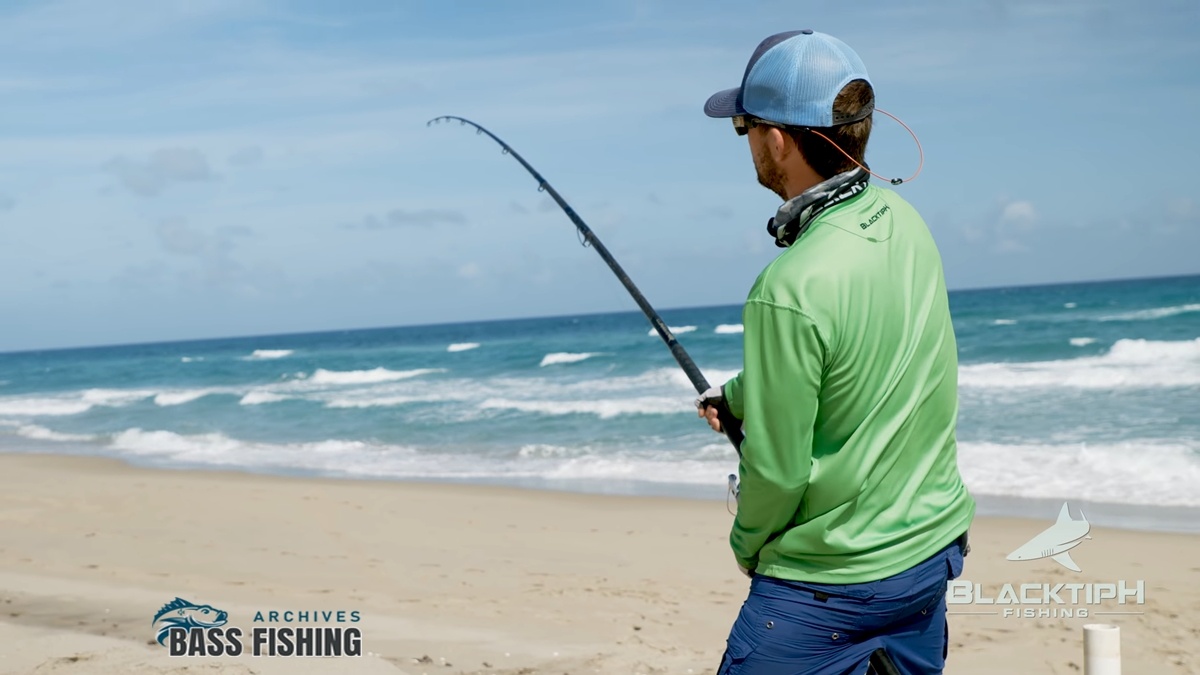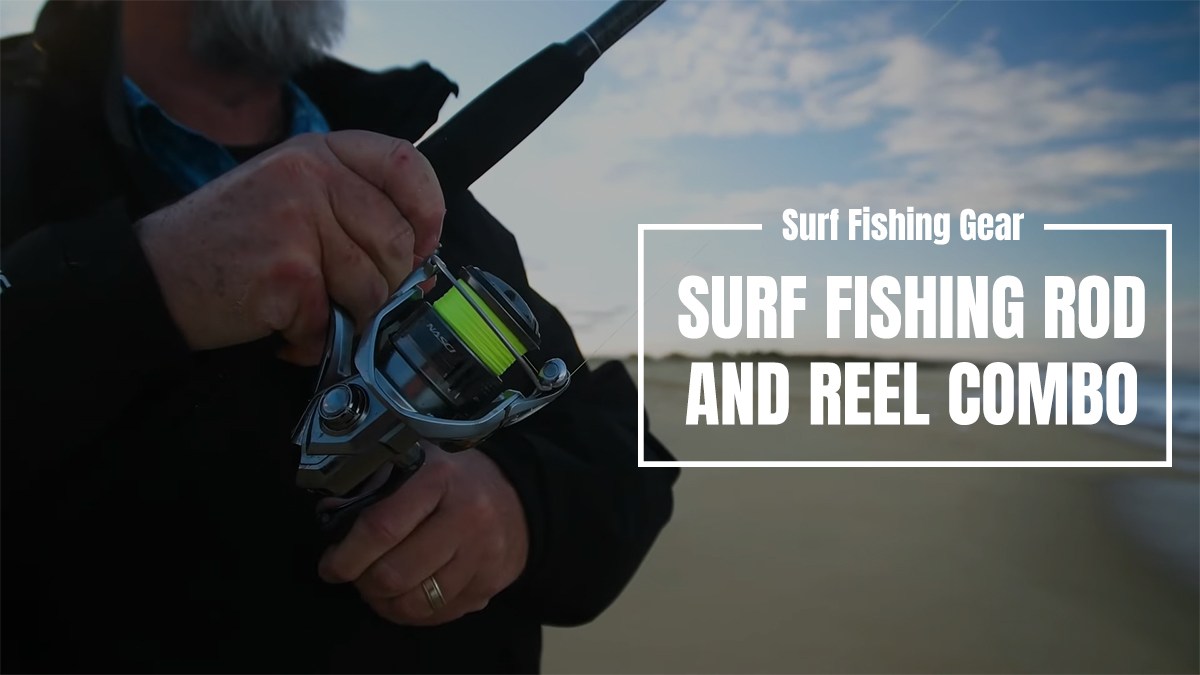Are you captivated by the thrill of surf fishing for sharks? Is the call of the deep-blue sea luring you to conquer it with a rod and reel in hand?

This comprehensive guide provides you with the requisite knowledge to explore the exhilarating realm of shark surf fishing. Gain insights into optimal locations, equipment, and techniques as you prepare to embark on an adventure that is equal parts exciting and demanding. Get ready to conquer the deep!
What Is Surf Fishing?
Surf fishing is an exhilarating way to fish from the shore. It involves using specialized equipment and techniques to cast lines far into the water in search of various fish species, including sharks.
Read more: Best line for surf fishing is usually a monofilament or braided line. You will also need a longer rod, some weights (sinkers), and bait to attract sharks.
What Is Surf Fishing For Sharks?

To successfully surf fish for sharks, you must know about bait types, tackle, rods and reels, safety precautions and other essential factors. Surf fishing equipment should be robust and dependable, as well as able to handle sharks with ease.
Your choice of line depends on the size of shark you are targeting. Generally speaking, a monofilament or braided line is best for medium-sized species, while a fluorocarbon line is usually used for larger species. You will also need several sinkers to keep your baits from being washed away by the surf.
Understanding how to find the best spots and various techniques is crucial to success.
Equipped with the perfect gear and fueled by an unwavering passion for the sport, you can embark on an extraordinary and indelible journey of conquering the magnificent depths.
Find out more: Best surf fishing rods for sharks, Best baits for surf fishing for sharks, Surf fishing tips and tricks.
What To Know Before You Go Surf Fishing For Sharks?
Before you get started, there are a few things you should know:
- Understand the types of rods and reels that will work best. Longer rods with heavy action will give you more casting distance, while lighter ones may be better suited for smaller species.
- Choose your bait wisely. You can use anything from cut bait to dead shrimp, squid, and crustaceans.
- Invest in the correct tackle, such as weights, hooks, and leader/line. Ganged hooks are best for large species like sharks.
- Ensure your line is appropriate for the size of your target shark. Heavier lines will give better results for bigger ones.
- Familiarize yourself with safety precautions. Sharks can be aggressive, so know your surroundings and never wade out too farIt’s super important to have a first aid kit on hand, just in case. Safety first, folks!
- Research the best spots for shark fishing near you and check tides and wind conditions before heading out.
- Have patience; finding the right spot and getting a bite takes time.
- Lastly, always ensure you have a valid fishing license before hunting.
Where To Find The Best Spots For Shark Fishing?
When it comes to finding the best spots for shark fishing, there are a few things you should keep in mind:
- Consider the type of shark you’re looking for. Different species will prefer different depths and types of habitats.
- Be aware of tide conditions; some sharks are more active during certain tides than others.
- Look out for places with deep channels and ledges, as this is where some species tend to hang out.
- Look for areas with plenty of baitfish, such as reefs or sea walls, as these are likely spots to find more giant sharks.
- Monitor the wind direction, as some sharks may be more active in specific directions.
- Research local regulations before setting off; some areas have restrictions on shark fishing that you need to be aware of.
- Remember to check water temperatures; different species of sharks prefer different temperature ranges.
- Lastly, remember that shark fishing is a numbers game; cast your line in many different spots to increase your chances of success.
Here are a few tips for finding the coolest shark fishing spots! With some research and patience, you’ll indeed find that perfect spot!
What Are Some Of The Most Necessary Equipment To Surf Fishing Sharks?
Surfing shark fishing requires some specific equipment to succeed, including:
| Equipment | Description |
|---|---|
| Long, Heavy Surf Rod | Essential for casting far and accurately. |
| Heavy Tackle (Ganged Hooks, Sinkers) | Helps catch larger sharks. |
| Specialized Weights | Keeps bait away from shore break. |
| Reel with Strong Drag | Necessary for fighting powerful sharks. |
| Braided Line | Super strong and abrasion-resistant. |
| Bait Bucket | Keeps bait fresh and lively. |
| Gloves | For handling tackle and shark safely. |
| Sun Protection | Sunscreen, sunglasses for element protection. |
| First Aid Kit | For emergencies. |
These essentials will greatly enhance your shark fishing adventure, ensuring an unforgettable experience and optimal results. With the right equipment and knowledge, the deep-blue waters will be yours to conquer! Happy Fishing!
Different Types Of Bait Used For Shark Fishing

When it comes to bait for shark fishing, several options are available. Here are some of the most popular:
- Live or dead fish such as mackerel, herring, menhaden, bluefish and mullet. These work best when used fresh and lively.
- Cut bait can come from almost any fish, including those listed above.
- Squid and octopus are also popular baits as they are easy to find and attract many shark species.
- Crustaceans such as crabs or shrimp make excellent natural bait for sharks.
- Artificial baits like rubber eels or lures can also be used correctly.
By experimenting with different baits, you can discover which works best for your shark fishing needs. However, it is essential to remember that whatever bait you use should be fresh and lively to attract sharks. Happy Hunting!
Different Types Of Tackle Used For Shark Fishing
When it comes to tackling, there are a few essential items you’ll need when fishing for sharks:
- Weights: choose the correct weight depending on the size of the shark you’re targeting. Heavier weights will give you more casting distance.
- Hooks: ganged or circle hooks are often best for larger species.
- Setup & Leader/Line: the type of line and leader you use should depend on the size of the shark you’re targeting.
- Rod and Reel: a longer, heavier rod and a powerful reel with a substantial drag are necessary for shark fishing.
- Accessories: gloves, line cutters, pliers, and hook removers can be helpful when dealing with larger species.
By choosing the right type of tackle, you can significantly improve your chances of success when fishing for sharks. The correct setup can make all the difference! Good luck and tight lines!
Safety Precautions When Surf Fishing For Sharks
Shark fishing can be a thrilling and rewarding experience, but it’s important to take safety precautions when dealing with these powerful creatures. Here are some tips to keep in mind:
- Always check the weather before heading out and consider postponing if conditions are too dangerous.
- Make sure you know the local regulations before setting off; some areas have restrictions on shark fishing that you need to be aware of.
- Stay alert when in the water, and watch for any signs of danger, such as rouge waves or strong currents.
- Stick with a; having someone with you in an emergency is always best.
- Ensure have the necessary equipment, including a first aid kit, sunscreen, and other safety gear like life jackets and wetsuits.
- Use caution when dealing with large species if possible, and be prepared to cut the line if needed.
- Always respect the wildlife; follow catch and release guidelines to ensure the sustainability of shark populations.
Following these safety precautions ensures that your next shark fishing excursion is safe and successful. Although it may require additional exertion, the ultimate outcome will undoubtedly justify the endeavor.
How Do You Surf Fishing For Small To Medium Size Sharks?

Surf fishing for smaller sharks is not only possible but can be an enjoyable experience as well! Here are some tips to keep in mind:
- Choose the right equipment; a medium-weight rod and reel with light tackle will give you more control when fighting smaller sharks.
- To attract smaller species, use smaller bait such as shrimp, squid, or small fish pieces.
- Look for areas with less current and near shore structure, such as rocks and reefs.
- Monitor the water for signs of activity, like baitfish or birds hovering overhead.
- Cast your bait close to shore but not too close; some sharks may be spooked by shallow water.
- Stay away from areas with strong currents or dangerous breakers.
- Reel in slowly and keep steady pressure on the line to tire out smaller sharks.
By following these tips, you too can experience the thrill of surf fishing for small to medium size sharks! With the proper knowledge and practice, you’ll be catching fish in no time.
What Are Some Species Of Shanks You Will Catch From The Beach?
Regarding surf fishing, various sharks can be caught on the beach. Here are some of the most common:
- Blacktip Sharks: usually have black tips on their dorsal fins and caudal fins and can grow up to 6 feet.
- Bull Sharks: are distinguishable by their blunt, rounded snout and can weigh up to 500 pounds.
- Hammerhead Sharks: have a unique hammer-shaped head and can reach lengths of up to 20 feet.
- Leopard Sharks: these small sharks have mottled, spotted patterns on their skin and can reach lengths up to 6 feet.
- Nurse Sharks: they are larger than leopard sharks and have longer tails for swimming.
- Other species: other less common species include dusky, tiger, sandbar and thresher sharks.
These are just some unique sharks that can be caught from the beach when surf fishing. Research and consult local regulations before heading out, as catching certain species may be prohibited in your area.
What Are Some Tips And Techniques For Catching Sharks?
Catching sharks is all about patience and practice, but there are some tips and techniques that can help improve your chances of success:
- Use the right bait; fresh fish or squid are usually best for attracting larger species.
- Change your baits often; this will help attract new fish and keep them interested.
- Let out plenty of lines; this can give you more casting distance and allow the shark to take the bait without feeling pressure on the line.
- Use a heavier sinker to help hold the bait in place and prevent it from being washed away by the current.
- Set the hook quickly; sharks have tough mouths, so you need to set the hook fast, or you may lose your chance at catching one.
- Reel in slowly and steadily; this will help tire out larger species and make it easier to bring them in.
By following these tips and techniques, you’ll be catching sharks in no time! Kindly keep in mind to cultivate patience and perseverance. Best wishes for success in all your endeavors!May success accompany you on your journey!
FAQs
Q: When to surf fishing for sharks on the beach?
The optimal period for shark surf fishing on the beach is generally during the warmer months of June through October, when water temperatures are typically higher. It is crucial to conduct thorough research on each species’ preferences prior to embarking on your fishing excursion.
Q: When is the best season to go shark fishing?
Shark fishing is highly advantageous during the warmer months of summer and fall, when the water temperatures reach their peak. This is the time when sharks are most active and eager for action, creating the perfect opportunity for thrilling encounters! 🦈 This is when many species are actively feeding and can be more likely to take the bait.
Q: What tide is the best for shark surf fishing?
A: The best tide for shark surf fishing is typically moving, such as the incoming or outgoing tide. These tides usually bring in more baitfish, which can attract more giant sharks. Additionally, try to fish during high tide when the water is more profound, and you can cast further into the surf. Again, it’s essential to research and consider the species you’re targeting before deciding on a tide.
Q: How should you set up your shark beach fishing rig?
A: Setting up your shark beach fishing rig depends on the species you’re targeting and the conditions of the beach. Generally, using a medium-weight rod and reel with light tackle and heavy sinkers is best. Attach sturdy hooks that can hold more giant sharks in case you get a bite! Lastly, just a friendly reminder to be cautious when fishing from the beach. You know, sharks and their sharp teeth can potentially cause some serious injury.It is always wiser to err on the side of caution and prioritize safety.
Q: How big should a surf rod be for sharks?
A: The size of the surf rod you use for sharks will depend on the species you target. Generally, it’s best to use a medium-weight rod with light tackle and heavy sinkers. However, you may need to invest in a heavier setup for larger species like Bull or Tiger Sharks.
Q: For surf shark fishing, how far should you cast?
A: Generally, you should cast your line as far into the surf as possible. This will give you the best chance of attracting larger species and allow them to take the bait without feeling any pressure on the line. Additionally, check local regulations regarding the maximum casting distance for the beach you plan to fish.
Q: What weight line should you use for shark surfing?
A: The weight of the fishing line you use for shark surfing will depend on the species you’re aiming for and the beach conditions. Generally, it’s best to use a medium-weight line with light tackle and heavy sinkers. However, you may need to invest in a heavier setup for larger species like Bull or Tiger Sharks.
Q: How is a shark rig set up for surf fishing?
A: Setting up a shark rig for surf fishing is relatively straightforward. Generally, using a medium-weight rod and reel with light tackle and heavy sinkers is best. Attach sturdy hooks that can hold larger sharks in case you get a bite! Lastly, exercise caution when fishing from the beach, as sharks possess sharp teeth and can inflict severe injuries.
Conclusion
Surf fishing for sharks can be an exciting and rewarding experience.Nevertheless, it necessitates patience, practice, and the appropriate setup.
By checking out the tips and doing some research before you head out, you’ll up your chances of nailing that shark catch on the beach. Good luck!If you use caution and stay safe, you should have no problem catching these fantastic creatures! Good luck out there!
source https://bassfishingarchives.com/surf-fishing-for-sharks/ by Clay Dyer

No comments:
Post a Comment